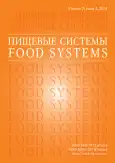Methodological approaches to gene identification of tea raw materials and raw material composition of tea-based soft drinks
- Autores: Vafin R.R.1, Mikhailova I.Y.1, Ageykina I.I.1
-
Afiliações:
- All-Russian Scientific Research Institute of Brewing, Beverage and Wine
- Edição: Volume 7, Nº 2 (2024)
- Páginas: 282-287
- Seção: Articles
- URL: https://ogarev-online.ru/2618-9771/article/view/311305
- DOI: https://doi.org/10.21323/2618-9771-2024-7-2-282-287
- ID: 311305
Citar
Texto integral
Resumo
Palavras-chave
Sobre autores
R. Vafin
All-Russian Scientific Research Institute of Brewing, Beverage and Wine
Email: agira_@ro.ru
7, Rossolimo Str., 119021, Moscow
I. Mikhailova
All-Russian Scientific Research Institute of Brewing, Beverage and Wine
Email: agira_@ro.ru
7, Rossolimo Str., 119021, Moscow
I. Ageykina
All-Russian Scientific Research Institute of Brewing, Beverage and Wine
Email: agira_@ro.ru
7, Rossolimo Str., 119021, Moscow
Bibliografia
- Ding, Y., Huang, H., Cui, H., Wang, X., Zhao, Y. (2023). A non-destructive method for identification of tea plant cultivars based on deep learning. Forests, 14(4), Article 728. https://doi.org/10.3390/f14040728
- De Castro, O., Comparone, M., Di Maio, A., Del Guacchio, E., Menale, B., Troisi, J. et al. (2017). What is in your cup of tea? DNA verity test to characterize black and green commercial teas. PLoS ONE, 12(5), Article e017826. https://doi.org/10.1371/journal.pone.0178262
- Fang, W., Meinhardt, L. W., Tan, H., Zhou, L., Mischke, S., Wang, X. et al. (2016). Identification of the varietal origin of processed loose-leaf tea based on analysis of a single leaf by SNP nanofluidic array. The Crop Journal, 4(4), 304-312. https://doi.org/10.1016/j.cj.2016.02.001
- Mphangwe, N. I. K., Vorster, J., Steyn, J. M., Nyirenda, H. E., Taylor, N. J., Apostolides, Z. (2013). Screening of tea (Camellia sinensis) for trait-associated molecular markers. Applied Biochemistry and Biotechnology, 171(2), 437-449. https://doi.org/10.1007/s12010-013-0370-4
- Hu, C. Y., Tsai, H. T., Chiu, C. F., Su, T. C., Le, N. H. K., Yeh, S. D. (2023). SSR-based molecular diagnosis for Taiwan tea cultivars and its application in identifying cultivar composition of the processed tea. Journal of Food and Drug Analysis, 31(3), 446-457. https://doi.org/10.38212/2224-6614.3465
- Li, J.-W., Li, H., Liu, Z.-W., Wang, Y.-X., Chen, Y., Yang, N. et al. (2023). Molecular markers in tea plant (Camellia sinensis): Applications to evolution, genetic identification, and molecular breeding. Plant Physiology and Biochemistry, 198, Article 107704. https://doi.org/10.1016/j.plaphy.2023.107704
- Li, L., Li, X., Liu, F., Zhao, J., Zhang, Y., Zheng, W. et al. (2023). Preliminary investigation of essentially derived variety of tea tree and development of SNP markers. Plants, 12(8), Article 1643. https://doi.org/10.3390/plants12081643
- Wang, L., Xun, H., Aktar, S., Zhang, R., Wu, L., Ni, D. et al. (2023). Development of SNP markers for original analysis and germplasm identification in Camellia sinensis. Plants, 12(1), Article 162. https://doi.org/10.3390/plants12010162
- Wei, K., Wang, X., Hao, X., Qian, Y., Li, X., Xu, L. et al. (2022). Development of a genome-wide 200K SNP array and its application for high-density genetic mapping and origin analysis of Camellia sinensis. Plant Biotechnology Journal, 20(3), 414-416. https://doi.org/10.1111/pbi.13761
- Fan, K., Zhang, J., Wang, M., Qian, W., Sun, L., Shen, J. et al. (2022). Development and application of SNP-KASP markers based on genes related to nitrogen uptake, assimilation and allocation in tea plant (Camellia sinensis L.). Agronomy, 12(10), Article 2534. https://doi.org/10.3390/agronomy12102534
- Khiavi, J. S., Falakro, K., Chaeikar, S. S. (2021). PCR-RFLP analyses of chloroplast DNA in some cultivated tea (Camellia sp.) genotypes. Journal of Horticulture and Postharvest Research, 4(1), 25-36. https://doi.org/10.22077/jhpr.2020.3116.1121
- Вафин, Р. Р., Михайлова, И. Ю., Агейкина, И. И., Харламова, Л. Н. (2024). Прогнозная модель сортовой идентификации чая ПЦР-ПДРФ-анализом SNP-маркеров Camellia sinensis. Пищевая промышленность, 1, 74-77. https://doi.org/10.52653/PPI.2024.1.1.014
- Ульянова, Е. В., Михайлова, И. Ю. (2024). Современные технологии в производстве напитков на основе чая. Пиво и напитки, 1, 23-27. https://doi.org/10.52653/PIN.2024.01.09
- Faller, A. C., Ragupathy, S., Shanmughanandhan, D., Zhang, Y., Lu, Z., Chang, P. et al. (2019). DNA quality and quantity analysis of Camellia sinensis through processing from fresh leaves to a green tea extract. Journal of AOAC International, 102(6), 1798-1807. https://doi.org/10.5740/jaoacint.18-0318
- Wu, Z., Li, X., Xu, X., Xing, A., Xu, Y., Yang, X. et al. (2023). Quality components identification and formation analysis of tea (Camellia sinensis L.) flower beverages from three cultivars. LWT, 181, Article 114739. https://doi.org/10.1016/j.lwt.2023.114739
- Ujihara, T. Hayashi, N. Tanaka, J. (2012). Identification of Material Cultivar of Green Tea Infusions by Simple Sequence Repeat Markers. Food Science and Technology Research, 18(2), 209-217. https://doi.org/10.3136/fstr.18.209
- Al-Janabi, S. M., McClelland, M., Petersen, C., Sobra, l B. W. S. (1994). Phylogenetic analysis of organellar DNA sequences in the Andropogoneae: Saccharinae. Theoretical and Applied Genetics, 88(8), 933-944. https://doi.org/10.1007/BF00220799
- Hwang, H., Bae, S. C., Lee, S., Lee, Y.-H., Chang, A. (2013). A rapid and simple genotyping method for various plants by direct-PCR. Plant Breeding and Biotechnology, 1(3), 290-297. https://doi.org/10.9787/PBB.2013.1.3.290
- Вафин, Р. Р., Михайлова, И. Ю., Агейкина, И. И., Харламова, Л. Н. (2023). Моделирование ДНК-технологии видовой идентификации сырьевого состава напитков на растительной основе. Пищевая промышленность, 8, 107-111. https://doi.org/10.52653/PPI.2023.8.8.020
- Вафин, Р. Р., Михайлова, И. Ю., Агейкина, И. И., Свиридов, Д. А., Ганин, М. Ю. (2023). Моделирование ДНК-технологии определения ботанического происхождения меда. Пищевая промышленность, 11, 72-75. https://doi.org/10.52653/PPI.2023.11.11.015
- National Institutes of Health (NIH). National Library of Medicine (NLM). National Center for Biotechnology Information (NCBI). (2022). tRNA-Val [Camellia sinensis]. Gene ID: 14412475, updated on 02-Apr-2022. Retrieved from https://www.ncbi.nlm.nih.gov/gene/14412475. Accessed April 21, 2024.
- National Institutes of Health (NIH). National Library of Medicine (NLM). National Center for Biotechnology Information (NCBI). (2022). 16S ribosomal RNA [Camellia sinensis]. Gene ID: 14412476, updated on 02-Apr-2022. Retrieved from https://www.ncbi.nlm.nih.gov/gene/14412476. Accessed April 21, 2024.
- Шеховцов, С. В., Шеховцова, И. Н., Пельтек, С. Е. (2019). ДНК-штрихкодирование: методы и подходы. Успехи современной биологии, 139(3), 211-220. https://doi.org/10.1134/S0042132419030074
Arquivos suplementares








